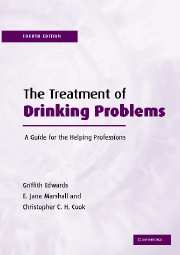Book contents
- Frontmatter
- Contents
- A note on the fourth edition
- Acknowledgements
- Introduction
- Part I Background to understanding
- Part II Screening, assessment and treatment
- 14 Case identification and screening
- 15 Assessment as the beginning of therapy
- 16 Withdrawal states and treatment of withdrawal
- 17 The basic work of treatment
- 18 Alcoholics Anonymous
- 19 Special techniques
- 20 Working towards normal drinking
- 21 When things go wrong, and putting them right
- 22 Treatment settings, professional roles and the organization of treatment services
- Author index
- Subject index
21 - When things go wrong, and putting them right
Published online by Cambridge University Press: 11 August 2009
- Frontmatter
- Contents
- A note on the fourth edition
- Acknowledgements
- Introduction
- Part I Background to understanding
- Part II Screening, assessment and treatment
- 14 Case identification and screening
- 15 Assessment as the beginning of therapy
- 16 Withdrawal states and treatment of withdrawal
- 17 The basic work of treatment
- 18 Alcoholics Anonymous
- 19 Special techniques
- 20 Working towards normal drinking
- 21 When things go wrong, and putting them right
- 22 Treatment settings, professional roles and the organization of treatment services
- Author index
- Subject index
Summary
Every attempt has been made in previous chapters of this book to present a perspective which avoids an idealized view of the therapeutic process as an operation smoothly and inevitably moving forward to success, as each patient responds to our wise and well-planned interventions. This chapter seeks further to correct any such caricature, and considers some problematic workaday situations.
Going wrong
People who wish to treat alcohol problems must develop an appreciation of the ways in which treatment can go wrong. They must train their eyes quickly to recognize these situations, and must be aware of the familiar patterns of events against which to interpret the latest instance of something going wrong. They must learn to examine the extent to which the therapist is going wrong, and the extent to which it is the patient, and most particularly to analyse what is amiss in the interaction. They must learn not to be discouraged or defeated by such events, but to turn them so far as possible to good therapeutic advantage. One cannot treat alcohol dependence without things very often going wrong, and the essence of treatment is usually a series of trials and errors rather than a straight-line advance. Such a statement is not to be read as a licence for complacency. True, things will go wrong and we must not be too flustered by that fact, but equally true is the insistence that the situation must be recognized and an effort made to put it right.
Information
- Type
- Chapter
- Information
- The Treatment of Drinking ProblemsA Guide for the Helping Professions, pp. 356 - 368Publisher: Cambridge University PressPrint publication year: 2003
